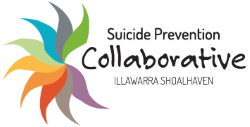With suicide being the leading cause of deaths for Australians aged between 15 and 44 years, a new cross-sectoral alliance has been formed in the Illawarra Shoalhaven, working together to lower suicide rates within the region. The Collaborative held its inaugural planning workshop on Thursday 21 April 2016 to help map the future direction of suicide prevention services in our region.
According to Dr Alex Hains, Mental Health Manager at Grand Pacific Health, the Illawarra Shoalhaven Suicide Prevention Collaborative (ISSPC) was formed in September 2015 and consists of more than 20 local organisations including government, non-government, health, education, emergency services, community, consumer and research bodies.
“An unacceptable number of people die each year by suicide. In Australia in 2014, more than 2,860 people died by suicide, and it is estimated that a further 20,000 people made a suicide attempt. Each suicide also effects a large number of people, such as the person’s family, friends, children, partners and work colleagues,” said Dr Hains.
“Yet, research tells us that suicide is preventable. Some of our leading organisations in Australia, such as the NHMRC Centre for Research Excellence in Suicide Prevention and the Black Dog Institute, report that suicidal urges can fluctuate and can drop over the course of several hours, that people who are feeling suicidal or have attempted suicide have often been in recent contact with health services, and that many medical and community interventions can prevent suicide, suicide attempts and suicidal thoughts,” he added.
So why have suicide rates stayed unacceptably high? Associate Professor Vida Bliokas, a member of the ISSPC and Head of Psychology in the Illawarra Shoalhaven Local Health District said: “Some of the problem seems to be that suicidal behaviour is extremely complex, with many risk factors across an individual’s lifespan interacting together; and the important issues for one person will be different from those for someone else.
“Given this, it makes sense that for interventions to work within a community, there needs to be a broad range of approaches, targeting many problem areas, simultaneously. There is some evidence in overseas research that this approach, called the systems approach, has helped to lower suicide numbers,” she added.
The planning workshop was held at the Kiama Pavilion on Thursday 21 April 2016 and local consumers, carers and representatives from local organisations were in attendance.
